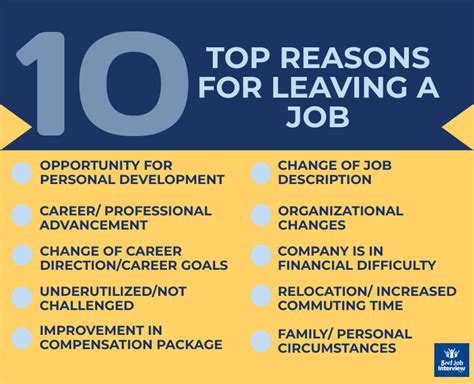Best (And Worst) Reasons For Leaving A Job

Leaving a job can be a difficult decision to make. Whether you’re seeking new opportunities or trying to escape a toxic work environment, there are many factors to consider before making the leap. In this article, we’ll explore the best and worst reasons for leaving a job and provide tips on how to approach the situation.
Best Reasons for Leaving a Job
1. Career Advancement
One of the most common reasons for leaving a job is to pursue career advancement opportunities. This can include taking on a new role with more responsibilities, moving up the corporate ladder, or pursuing a job in a different industry. If you feel like you’ve hit a ceiling in your current role and there’s no room for growth, it may be time to consider a change.
2. Better Work-Life Balance
Another valid reason for leaving a job is to achieve a better work-life balance. If your current job requires long hours or frequent travel that is taking a toll on your personal life, it may be time to look for a job that offers more flexibility and a better work-life balance. This can include flexible schedules, remote work options, or a more relaxed company culture.
3. Company Culture
Company culture can have a significant impact on employee satisfaction and engagement. If you find yourself in a toxic work environment with little support from management or colleagues, it may be time to look for a company with a more positive and supportive culture. A company that values its employees and fosters a positive work environment can make all the difference in your job satisfaction.
4. Better Compensation and Benefits
Money isn’t everything, but it can play a significant role in job satisfaction. If you feel like you’re underpaid or your benefits package is lacking, it may be time to look for a job that offers better compensation and benefits. This can include higher salaries, better health insurance, retirement plans, and other perks like gym memberships or stock options.
5. Relocation
Another reason for leaving a job can be relocation. If you or your spouse is offered a job in a different city or state, it may be necessary to leave your current job. This can be an exciting opportunity to start fresh in a new location and pursue new career opportunities.
Worst Reasons for Leaving a Job
1. Burnout
Burnout is a common problem in today’s fast-paced work environment. However, leaving a job solely because of burnout may not be the best decision. Before quitting your job, consider talking to your manager about reducing your workload or taking time off to recharge. If you’re unable to find a solution, it may be time to start looking for a new job.
2. Conflict with Co-workers
Conflict with co-workers can be stressful and frustrating, but it shouldn’t be the sole reason for leaving a job. Before making any decisions, try to resolve the conflict through open communication and conflict resolution techniques. If the conflict cannot be resolved, it may be time to consider leaving the company.
3. Boredom
If you’re feeling bored or unchallenged in your current role, it may be tempting to leave for a more exciting job. However, before making any decisions, consider talking to your manager about taking on new responsibilities or projects that align with your career goals. If there are no opportunities for growth within the company, it may be time to start looking for a new job.
4. Short-Term Monetary Gain
Leaving a job solely for a short-term monetary gain, such as a signing bonus or a higher salary, may not be a wise decision in the long run. While the extra money may be tempting, it’s important to consider the long-term career prospects and job satisfaction before making any decisions.
5. Impulsive Decisions
Finally, leaving a job on impulse without careful consideration can be a costly mistake. It’s important to take the time to evaluate your current job situation and your career goals before making any decisions. Impulsive decisions can lead to regret and a difficult job search process.
Conclusion
Leaving a job can be a difficult decision, but it’s important to consider the reasons behind your decision and ensure that you’re making the right choice. Whether you’re leaving for career advancement opportunities, better work-life balance, or a more positive company culture, make sure that you’re leaving for the right reasons. On the other hand, leaving a job solely because of boredom, conflict with co-workers, or short-term monetary gain may not be the best decision in the long run.
FAQs
Q: How do I know if it’s time to leave my job?
A: If you’re feeling unfulfilled in your current role, have hit a ceiling in terms of growth opportunities, or are experiencing a toxic work environment, it may be time to consider leaving your job. However, it’s important to carefully evaluate your reasons for leaving and ensure that you’re making the right decision for your career.
Q: How do I approach my manager about leaving?
A: When approaching your manager about leaving, it’s important to be honest and direct. Explain your reasons for leaving and express your appreciation for the opportunities and experiences you’ve had at the company. Offer to help with the transition process and maintain a positive relationship with your manager and colleagues.
Q: How do I handle potential employers asking why I left my previous job?
A: When asked why you left your previous job, it’s important to be honest and professional. Focus on the positive reasons for leaving, such as pursuing new career opportunities or a better work-life balance. Avoid badmouthing your previous employer or colleagues and maintain a positive attitude throughout the interview process.
